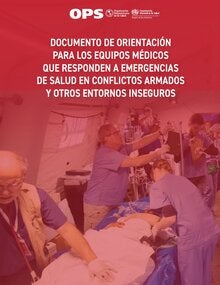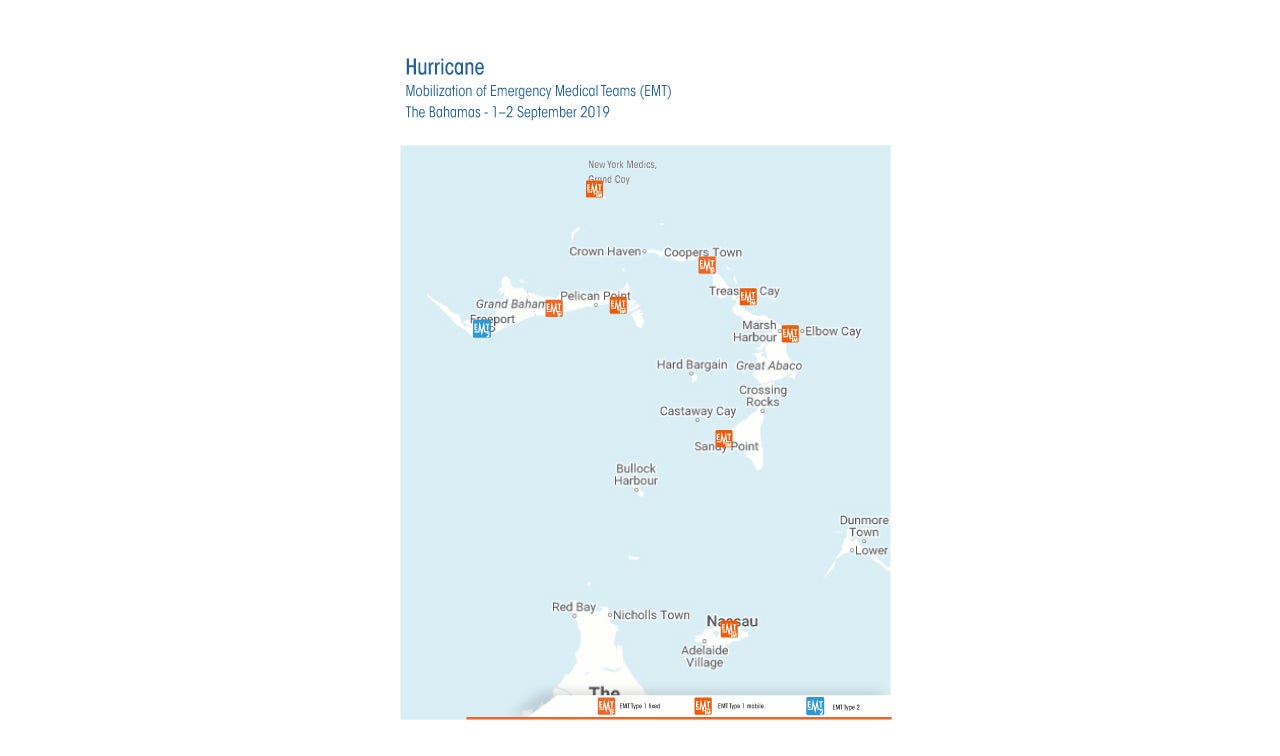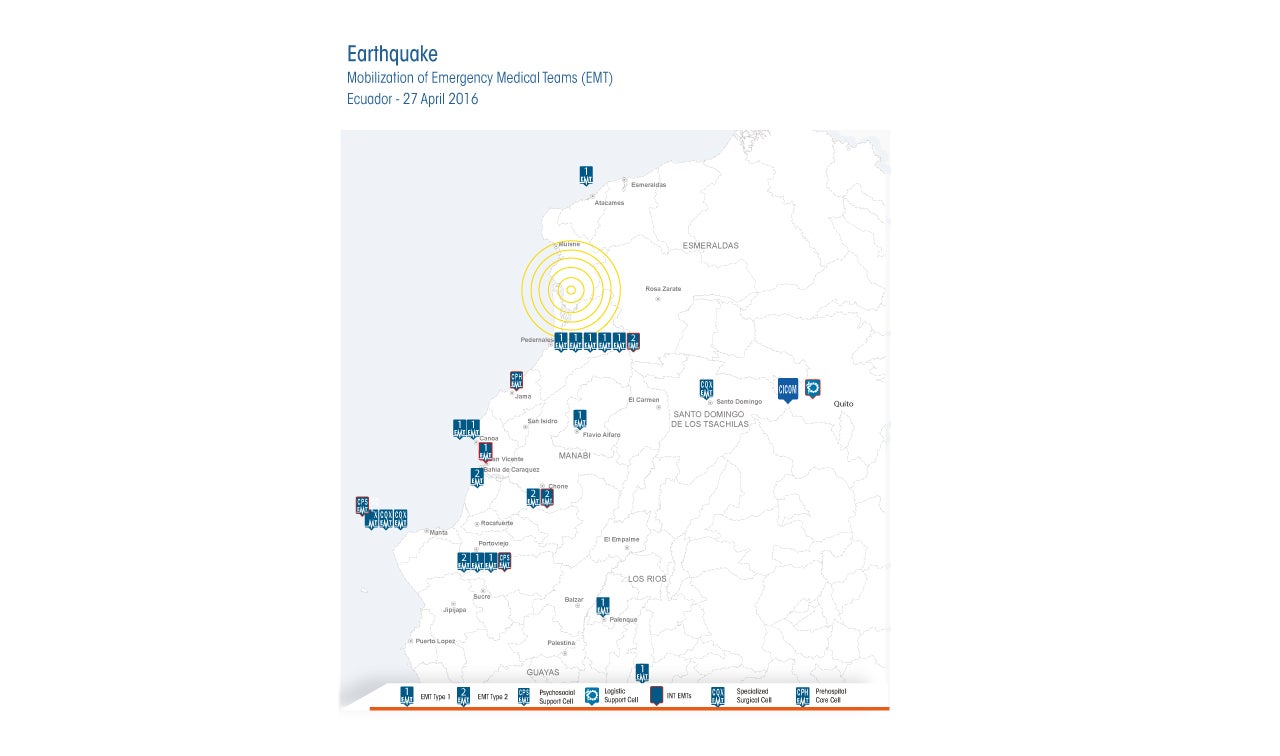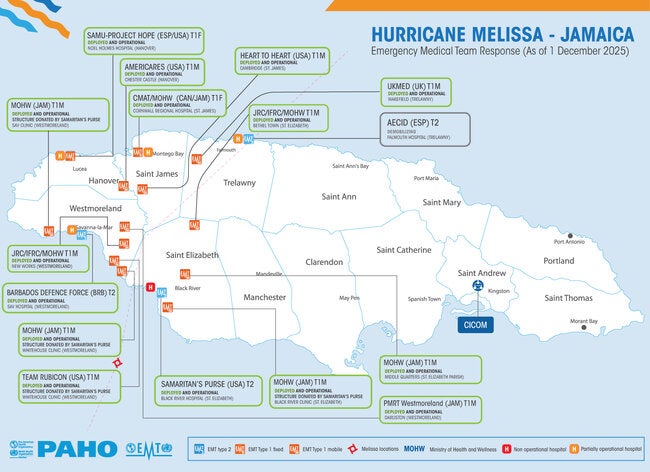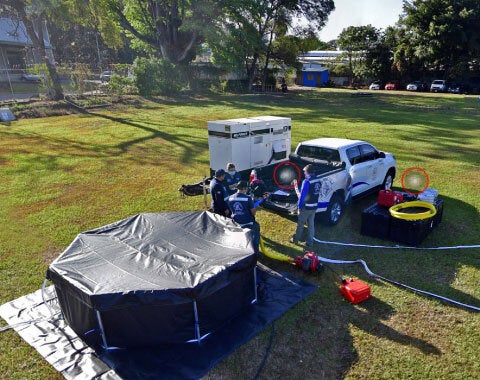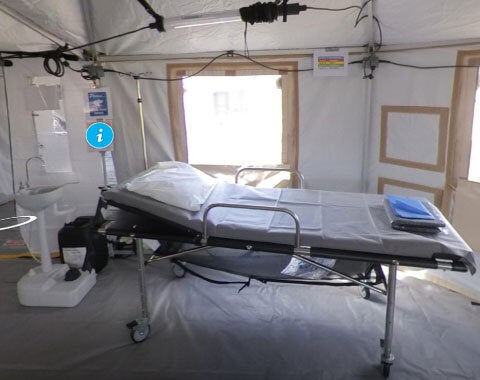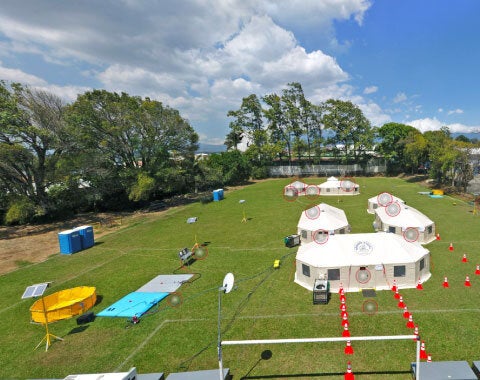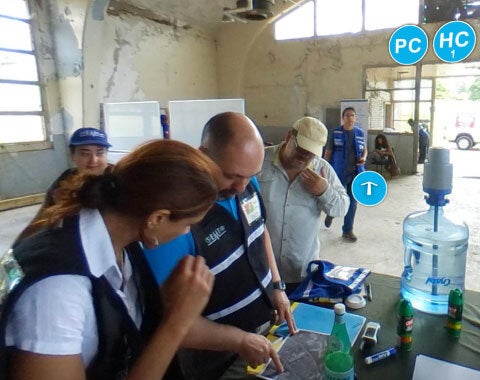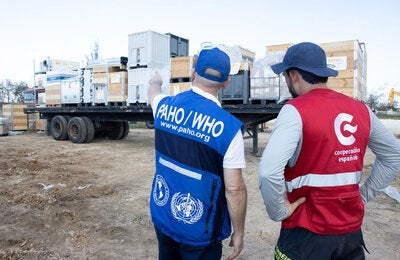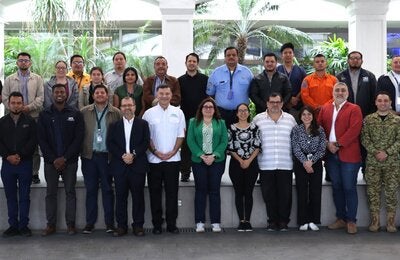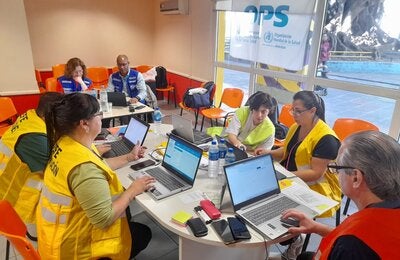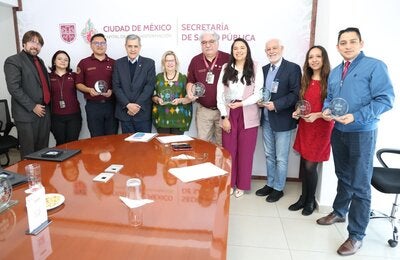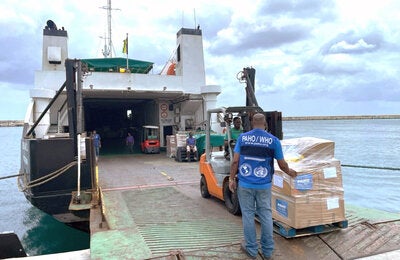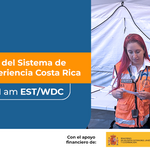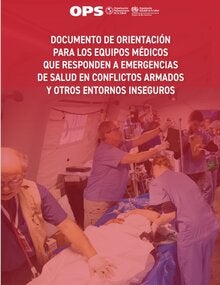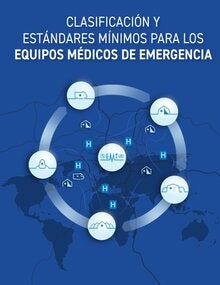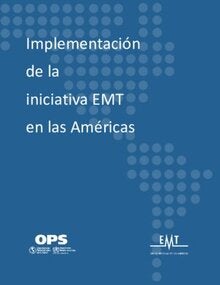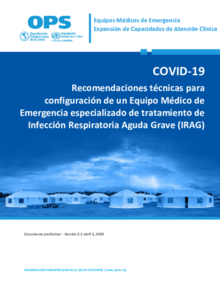El análisis sobre la "Respuesta de Salud al Terremoto de Haití" demostró, al igual que en otras emergencias anteriores, que aunque la respuesta fue importante y se pudo contar con equipos médicos eficientes que salvaron bastantes vidas, también hubo un importante número que no estaban preparados o incluso llegaron a ser incompetentes para el cuidado médico requerido por los pacientes. La publicación sobre las lecciones de la respuesta de salud en Haití que debían ser aprendidas para futuros desastres demostró la necesidad de desarrollar principios, criterios y estándares para la respuesta de los equipos médicos en casos de emergencias y desastres, en línea con los procesos globales para mejorar las normas y estándares humanitarios.
En este contexto la Organización Panamericana de la Salud convocó una reunión de expertos del 7 al 9 de diciembre de 2010 en Cuba para, entre otros, revisar la "Guía para el uso de hospitales de campaña extranjeros en casos de desastres" publicada por la OPS/OMS en el 2003 y optimizar los procesos de solicitud, aceptación y coordinación de los equipos médicos internacionales con el objetivo de mejorar la rapidez en la respuesta y eficiencia en el despliegue. Este grupo de expertos elaboró un reporte de la reunión que constituye las bases de la iniciativa que hoy en día conocemos como "Equipos Médicos de Emergencia".
El Consejo Directivo de la OPS, conformado por representantes de los Estados Miembros, estableció el "Plan de Acción para Coordinar la Asistencia Humanitaria en las Américas" aprobado en la 53 edición del Consejo y donde se considera la implementación en los Estados Miembros de procedimientos de respuesta y los mecanismos nacionales flexibles de registro para los Equipos Médicos de Emergencia.
EMT Américas
Los EMT son equipos de profesionales de salud (médicos, enfermeros, fisioterapeutas, paramédicos, etc.) que prestan atención clínica directa a las personas afectadas por emergencias y desastres, y apoyan los sistemas de salud locales.
Los EMT pueden pertenecer tanto a organizaciones gubernamentales (equipos civiles y militares) como no gubernamentales, y su respuesta puede ser nacional o internacional.
Tradicionalmente, estos equipos se han centrado en la gestión de la atención traumatológica y quirúrgica, pero la respuesta al brote de ébola demostró el valor que pueden tener en otros contextos, como epidemias y emergencias complejas.
Los EMT trabajan bajo la dirección general de la Clasificación y Normas Mínimas para Equipos Médicos de Emergencia en desastres repentinas.
- Garantizar que los equipos médicos de emergencia bien formados y autosuficientes puedan dar una respuesta oportuna para ayudar a las personas afectadas por catástrofes y emergencias.
Disponer de mecanismos de clasificación global y registro nacional para facilitar la aceptación y el despliegue de equipos médicos de emergencia que cumplan los requisitos mínimos de las normas EMT. - Los equipos médicos gubernamentales y de agencias desplegados podrán demostrar que operan conforme al sistema de normas y coordinación de los EMT.
- La creación de una comunidad mundial y regional de EMT que permita el intercambio de conocimientos y mejores prácticas entre los equipos médicos de emergencia.
- Disponer de EMT nacionales bien formados y autosuficientes para garantizar una respuesta rápida en sus propios países y en la región.
The global EMT initiative is implemented through the Global Secretariat and its three Regional Secretariats for Africa, Americas, South-East Asia, Europe, Eastern Mediterranean and Western Pacific.
The EMT initiative in the Americas is implemented through the Pan American Health Organization and comprised of the Regional EMT Secretariat, the Regional EMT Group, and the national EMT focal point network.
Documents:
- EMT Regional Meeting of the Americas: Report and Recommendations; 2017
- Implementation of the EMT initiative in the Americas 2020 (Eng)
- Implementación de la iniciativa EMT en las Américas 2020 (Spa)
- Implementação da iniciativa EMT nas Américas 2020 (Por)
- Mise en oeuvre de l’initiative EMT dans les Amériques 2020 (Fre)
La OPS actúa como Secretaría del Grupo Regional de EMT en las Américas y proporciona asesoramiento técnico para:
La preparación de procedimientos y herramientas para solicitar, aceptar y recibir EMT;
La integración de la CICOM (Coordinación de Equipos Médicos de Emergencia) con los Centros de Operaciones de Emergencia (COE) en salud;
El diseño y creación de EMT a nivel nacional;
El desarrollo de mecanismos nacionales de registro, tanto para equipos nacionales como internacionales;
La optimización de los procesos de inmigración, aduanas y logística para facilitar el despliegue de los EMT;
El fortalecimiento de las capacidades nacionales de los EMT en las Américas;
El desarrollo y apoyo de talleres nacionales para la coordinación de los EMT;
La organización de talleres regionales para coordinadores de EMT;
El mantenimiento de una lista regional de coordinadores de EMT para que los activen los países que los necesiten;
El apoyo la preparación de tarjetas logísticas nacionales para el despliegue de los EMT;
La promoción y el intercambio regional y mundial de conocimientos y buenas prácticas.
- Participación activa en el Grupo Regional Americano de EMT;
- Actualización de los procedimientos y directrices nacionales para solicitar, aceptar y recibir Equipos Médicos de Emergencia;
- Fomento de la clasificación de los EMT nacionales;
- Desarrollo un mecanismo nacional para el registro de Equipos Médicos de Emergencia nacionales e internacionales;
- Desarrollo herramientas para la gestión de la información y la coordinación de los EMT;
- Intercambio experiencias y buenas prácticas de los EMT con el resto de la Región.
Para más información sobre la iniciativa EMT contactar a Luis de la Fuente Martín: emt@paho.org
- Classification and Minimum Standards for Foreign Medical Teams in Sudden Onset Disasters (Blue Book)
- Nota Técnica sobre los requisitos mínimos de los Equipos Médicos de Emergencia (EMT) que responden a desastres y emergencias en las Américas (Spa)
- Nota Técnica Requisitos mínimos para as Equipes Médicas de Emergência (EMTs) que respondem a desastres e emergências nas Américas (Por)
- Note Technique Exigences minimales pour les équipes médicales d’urgence (EMT) intervenant dans les cas de catastrophes et urgences dans les Amériques (Fre)
- EMT Regional Meeting of the Americas: Report and Recommendations; 2017
- Implementation of the EMT initiative in the Americas 2020 (Eng)
- Implementación de la iniciativa EMT en las Américas 2020 (Spa)
- Implementação da iniciativa EMT nas Américas 2020 (Por)
- Mise en oeuvre de l’initiative EMT dans les Amériques 2020 (Fre)
- Health response to the earthquake in Haiti
- Technical note with minimum requirements for EMTs responding to disasters in the Americas (Only in Spanish)
- Classification and Minimum Standards for Foreign Medical Teams in Sudden Onset Disasters
- Spanish Cooperation operation guidelines for direct health response in disasters (Only in Spanish)
- Resolution CD53.R9 "Plan of Action for the Coordination of Humanitarian Assistance in the Americas"
- Summary from the Global EMT Meeting - Panama 2015
Fortaleciendo la capacidad nacional de equipos médicos de emergencia y asegurando el acceso a servicios de salud esenciales, de calidad y que salvan vidas a través de equipos médicos de emergencia nacionales efectivos, escalables, interoperables y de despliegue rápido y que se integraran plenamente en las redes locales de servicios de salud.
¿Listo para unirte a EMT Américas?
Tablero de la Iniciativa EMT Américas
Movilizaciones de EMTs destacadas en respuesta a emergencias recientes
- COVID-19 EMT Response ▼
- Earthquake: Haiti 2021 ▼
- Hurricanes Eta and Iota 2020 ▼
- Hurricane Bahamas 2019 ▼
- Earthquake Ecuador 1016 ▼
Emergency Medical Teams (EMTs) Deployed and Mobilizing in Response to Hurricane Melissa - Jamaica
Visitas virtuales 360
Herramientas
SISMED911 es una plataforma tecnológica para optimizar los procesos de recepción y priorización de llamadas al 911, así como la coordinación y despacho de recursos de respuesta a emergencias. Cuando el tiempo es esencial para garantizar que el paciente reciba la atención necesaria y pueda ser transportado a la instalación adecuada, este tipo de plataforma mejora los tiempos de respuesta y asegura una comunicación efectiva entre todas las entidades involucradas en el cuidado y transporte del paciente. Leer más
O2PREP es una aplicación para apoyar a los EMTs y a los nuevos hospitales o hospitales en proceso de expansión o remodelación en la gestión de oxígeno médico. La herramienta permite una proyección de la demanda esperada de oxígeno según el número de camas, así como posibles usos derivados de situaciones de emergencia o contingencia. Ver aplicativo
Virtual CICOM es una herramienta en línea para gestionar la solicitud y oferta de equipos médicos de emergencia y la coordinación de su respuesta y despliegue. La plataforma facilita el flujo de información entre todos los actores de respuesta y coordinación. Actualmente, 30 equipos médicos de emergencia de 18 países de las Américas están utilizando esta herramienta. Desde su creación, el CICOM Virtual se ha activado 27 veces durante emergencias o ejercicios SIMEX.
SIMEXaméricas es una herramienta virtual colaborativa que permite realizar ejercicios de simulación enfocados en la respuesta a emergencias, desastres y pandemias. La herramienta permite que los ejercicios SIMEX se adapten a un entorno virtual o híbrido y facilita la interacción directa de los participantes al realizar tareas e intercambiar mensajes en tiempo real y de manera asincrónica.





